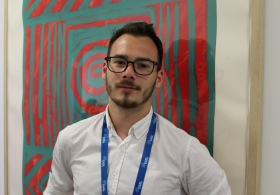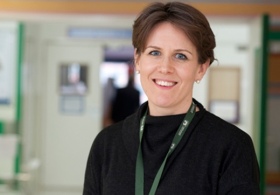Nurses, speech therapists and sonographers researching better patient care
by Maxine Myers

A programme to support a wider range of clinical staff to undertake research enters its fourth year with the arrival of three new fellows.
Working in the fields of nursing, sonography and speech therapy, the three will undertake research over the next year as part of Imperial’s Research Fellowship Scheme.
Their projects include: Using ultrasound techniques to diagnose liver disease more effectively, investigating swallowing and voice outcomes in patients with a rare airway disorder and exploring ways to better prepare cancer patients for surgery.
The scheme was set up in 2014 to give staff working at Imperial College Healthcare NHS Trust (ICHT) in nursing, midwifery, allied health professions, pharmacy and healthcare science the same clinical academic training opportunities as doctors. Recipients have the opportunity to develop their research skills and experience so that they can apply for a Masters or PhD and progress in their clinical academic career.
The three fellowships are worth up to £50,000 each and are jointly funded by Imperial College Health Charity and Imperial NIHR Biomedical Research Centre (BRC). Some of the fellows will work alongside researchers at Imperial College London.
Research can lead to better clinical practices and our allied health professionals have a unique perspective on patient healthcare and ideas on how we can address challenges in delivering effective care.
– Waljit Dhillo
Professor in Endocrinology and Metabolism at Imperial College London
Champion of the scheme and Professor in Endocrinology and Metabolism at Imperial College London, Waljit Dhillo said: “I am very pleased to welcome this year’s new fellows to the research fellowship scheme. Research can lead to better clinical practices and our allied health professionals have a unique perspective on patient healthcare and ideas on how we can address challenges in delivering effective care. This year’s recipients are working on a diverse range of projects which could have real benefits for patients.”
Here we meet the new intake.
Tim Hoogenboom, Research Sonographer

Tim Hoogenboom will be investigating whether ultrasound and image analysis technology can be used to assess and describe liver damage of patients.
There are more than 100 different types of liver disease, which together affect at least 2 million people in the UK. It is the only major cause of death that is increasing ever year due to factors such as obesity, undiagnosed hepatitis infection and alcohol misuse.
Doctors currently perform a biopsy, where a needle is used to take some tissue, to estimate how severe the liver disease is. However, this procedure is invasive and can cause discomfort, bruising and excessive bleeding. A liver biopsy doesn’t give doctors a full picture of what is happening to the liver due to the small sample of the biopsy.
Up to 100 patients with liver disease and healthy volunteers will undergo detailed ultrasound imaging to examine the blood flow through the liver. The results of the scans will be analysed with a computer, and tested against blood tests and other clinical information. This could be used to identify patients who are most at risk of their disease progressing.
Hoogenboom said: “The number of people suffering from liver disease is on the rise in the UK. New methods that can identify early changes in the liver are urgently needed. My research project could help patients by allowing us to identify at risk patients quicker so that we can provide treatment and support to those who need it, and prevent end-stage liver disease and liver cancer."
Gemma Clunie, Clinical Specialist Speech and Language Therapist
 The aim of Clunie’s project is to see whether a swallowing assessment tool used for patients with head and neck cancer can also be used to evaluate the difficulties patients face with airway stenosis, a rare condition that causes narrowing of the airways and obstructs air into the lungs.
The aim of Clunie’s project is to see whether a swallowing assessment tool used for patients with head and neck cancer can also be used to evaluate the difficulties patients face with airway stenosis, a rare condition that causes narrowing of the airways and obstructs air into the lungs.
Patients with the condition experience breathing difficulties, problems with voice quality and swallowing food and drinks. Swallowing difficulties can lead to potentially life-threatening pneumonia or malnutrition.
Current treatment for airway stenosis is focused mainly on surgery to remove the obstruction with speech and language therapy input if needed.
Patients also have a special x-ray that looks at their swallowing movements called a videofluoroscopy.
Clunie will use the DIGEST scale on 50 patients with airway stenosis to assess the safety and efficiency of their swallowing. The tool will be used to mark how food or fluid enters the airway and the patient’s response to this. The results will be used with other clinical information to develop more personalised treatments such as swallowing exercises for patients and implement them at an earlier stage.
Clunie will also conduct a focus group to talk to patients about how to improve their care in relation to their swallowing and voice difficulties. Their answers will provide a framework to make improvements and develop further research.
Clunie said: “Swallowing and voice difficulties are two outcomes of airway stenosis that can be overlooked as current treatment is focused on improved breathing. It can have a negative impact on a patient’s quality of life. My research could benefit patients as we’ll be able to assess the exact nature and extent of their swallowing and voice problems and devise treatments based on their individual needs.”
Venetia Wynter-Blyth, Macmillan Nurse Consultant

Venetia Wynter-Blyth will be exploring adherence to exercise before surgery as part of a prehabilitation programme.
Prehabilitation addresses the nutritional, psychological and physical needs of the individual in order for them to better withstand the stress of surgery.
ICHT has its own prehabilitation programe called PREPARE for cancer patients. Since the launch of the programme in 2015 there’s been a reduction in post-operative complications experienced and a reduction in length of stay in hospital.
Exercise is a fundamental aspect of prehabilitation and, in order to derive maximum benefit, it is important that people adhere to the prescribed programme.
Wynter-Blyth will undertake an exploratory study to better understand what the barriers and facilitators are to exercise in a surgical prehabilitation programme. The results of the study will be used to streamline and personalise the prehabilitation programme.
“More people are surviving cancer due to advances in treatments. However, there is a recognised need to prepare patients and engage them with their care at the earliest possible opportunity so that they can manage their symptoms. The results of this study could help us make further changes to our PREPARE programme so we can better support patients through their cancer treatment.
The Research Fellowships Scheme is an example of the education and training opportunities offered by Imperial College Academic Health Science Centre, a partnership between Imperial College London, Imperial College Healthcare NHS Trust, Royal Brompton & Harefield NHS Foundation Trust and Royal Marsden NHS Foundation Trust.
It aims to transform healthcare by turning scientific discoveries into medical advances to benefit local, national and global populations in as fast a timeframe as possible.
Article text (excluding photos or graphics) © Imperial College London.
Photos and graphics subject to third party copyright used with permission or © Imperial College London.
Reporter
Maxine Myers
Communications Division